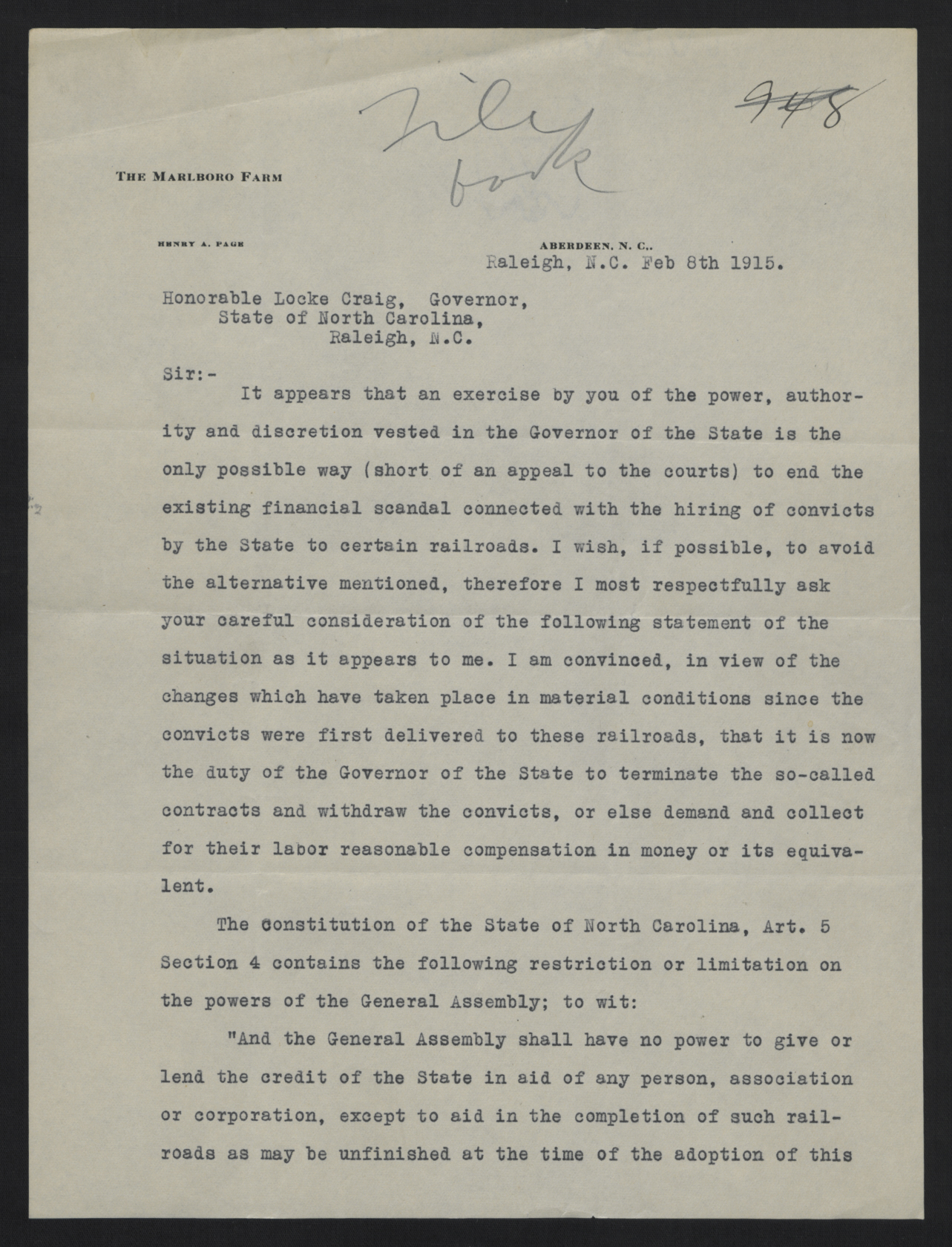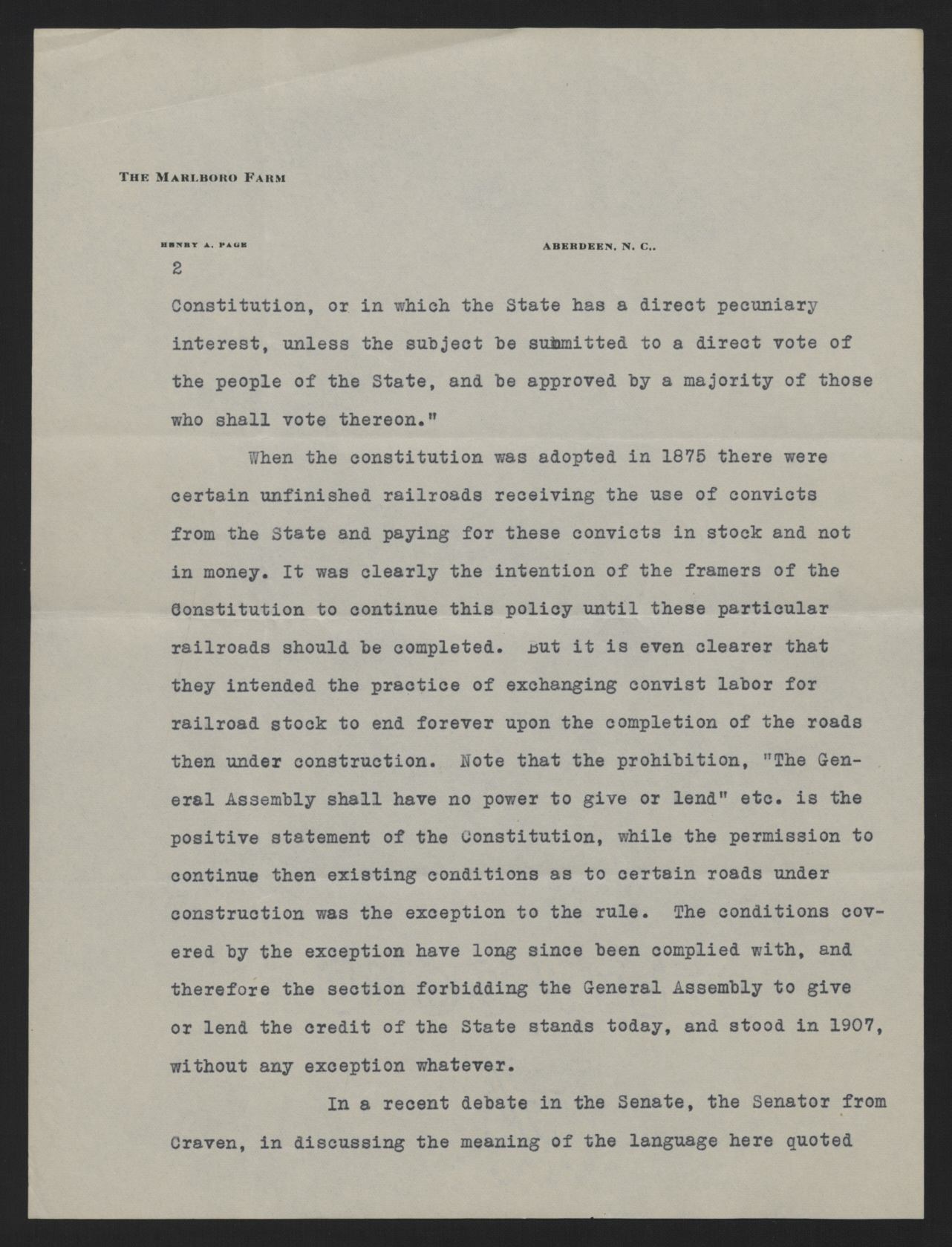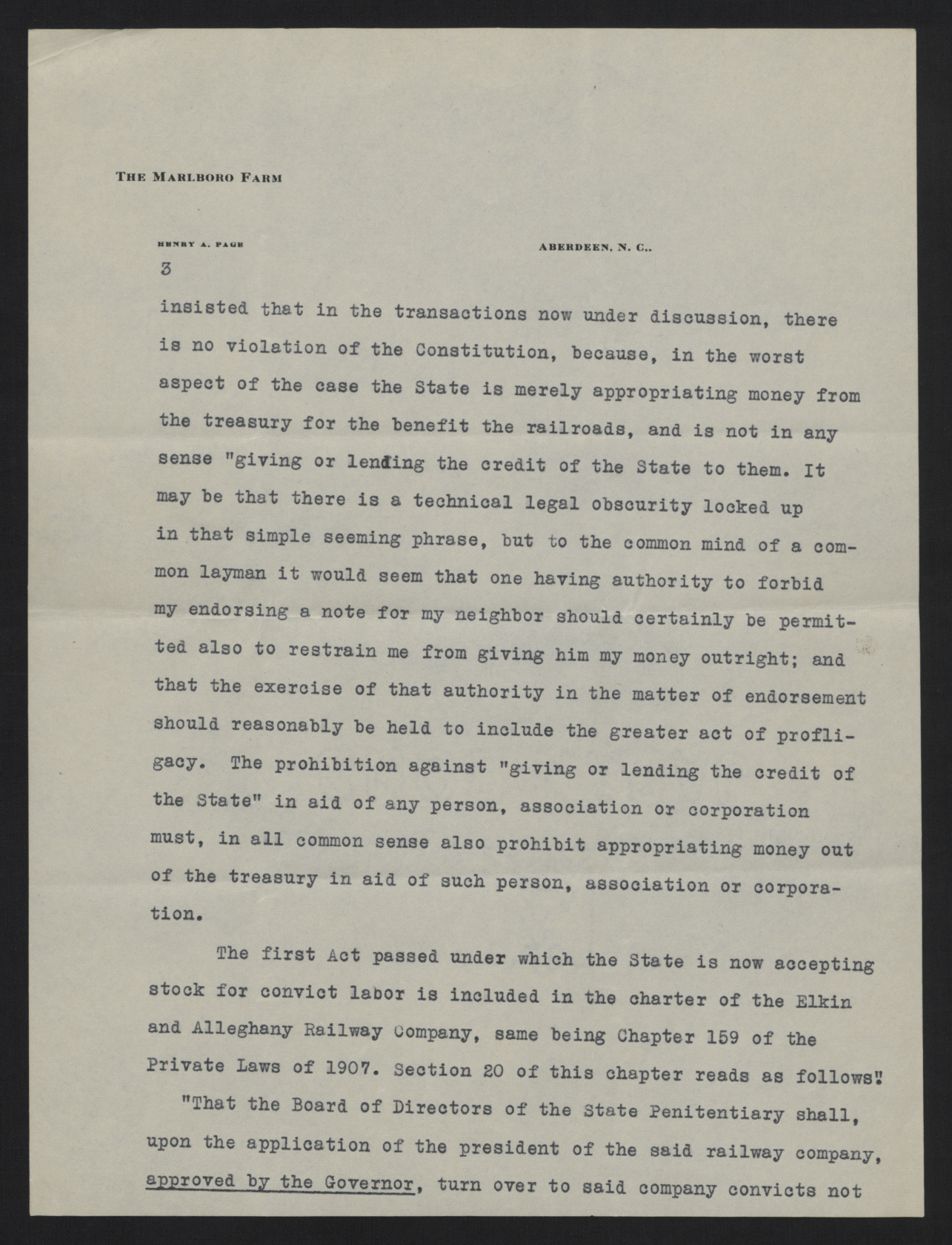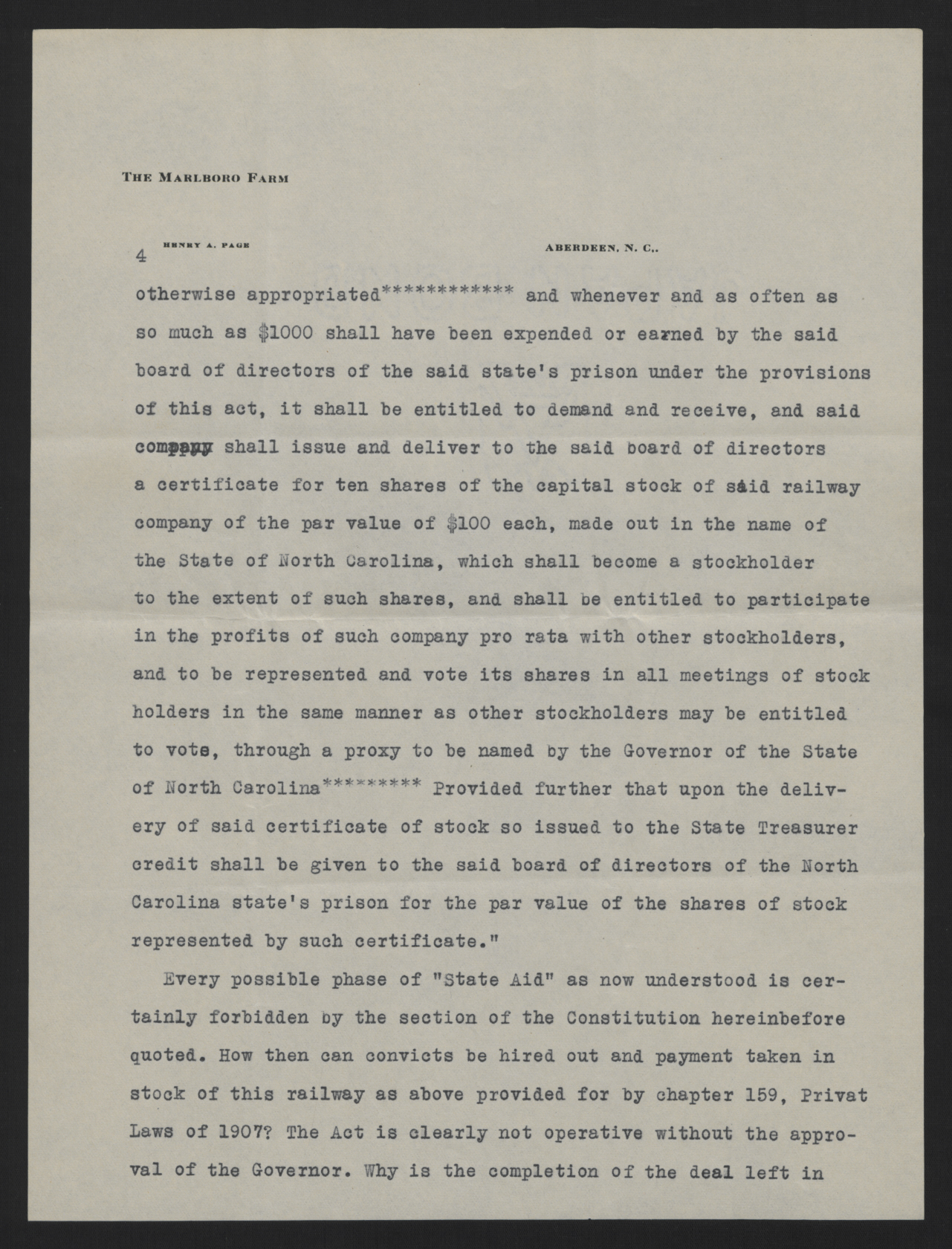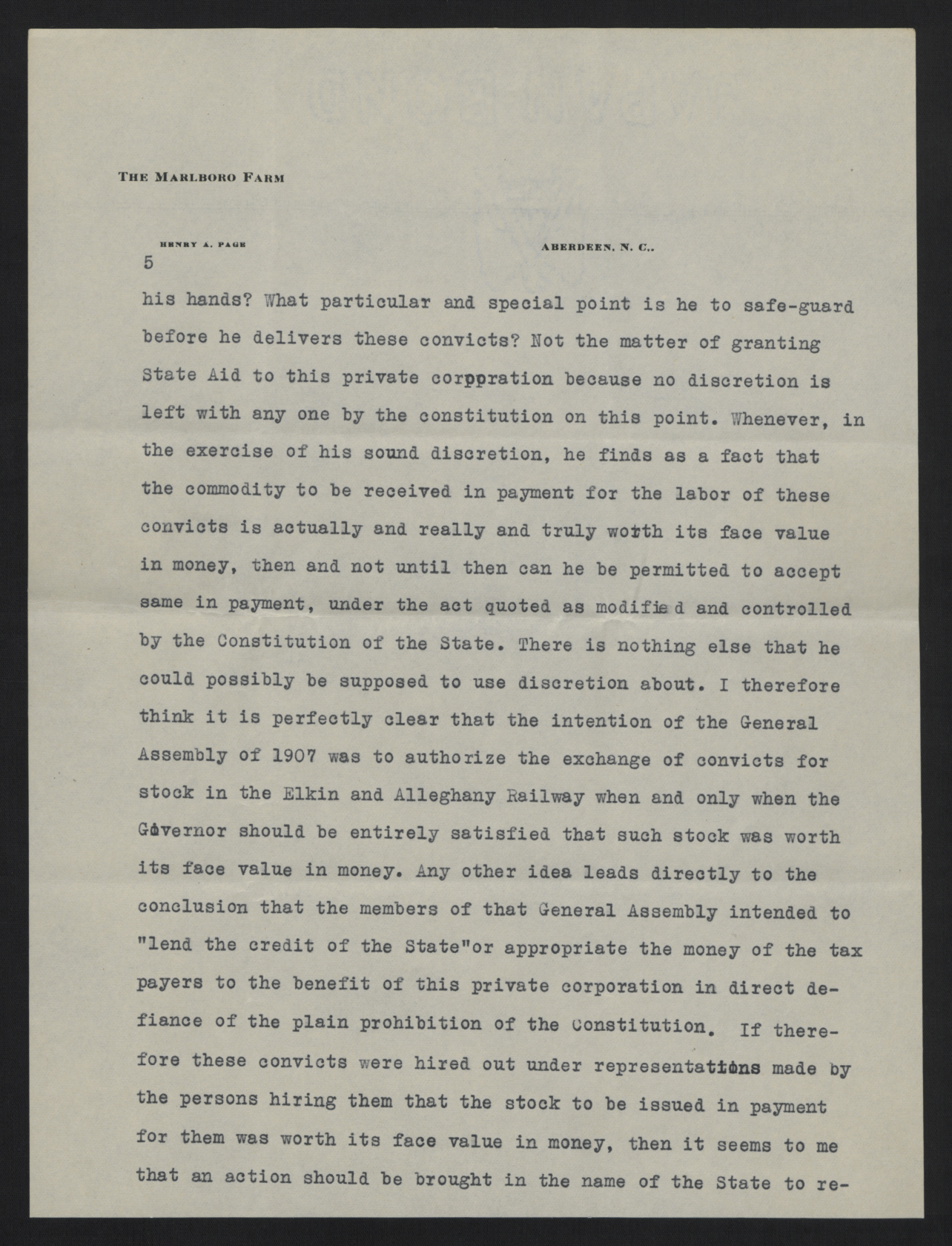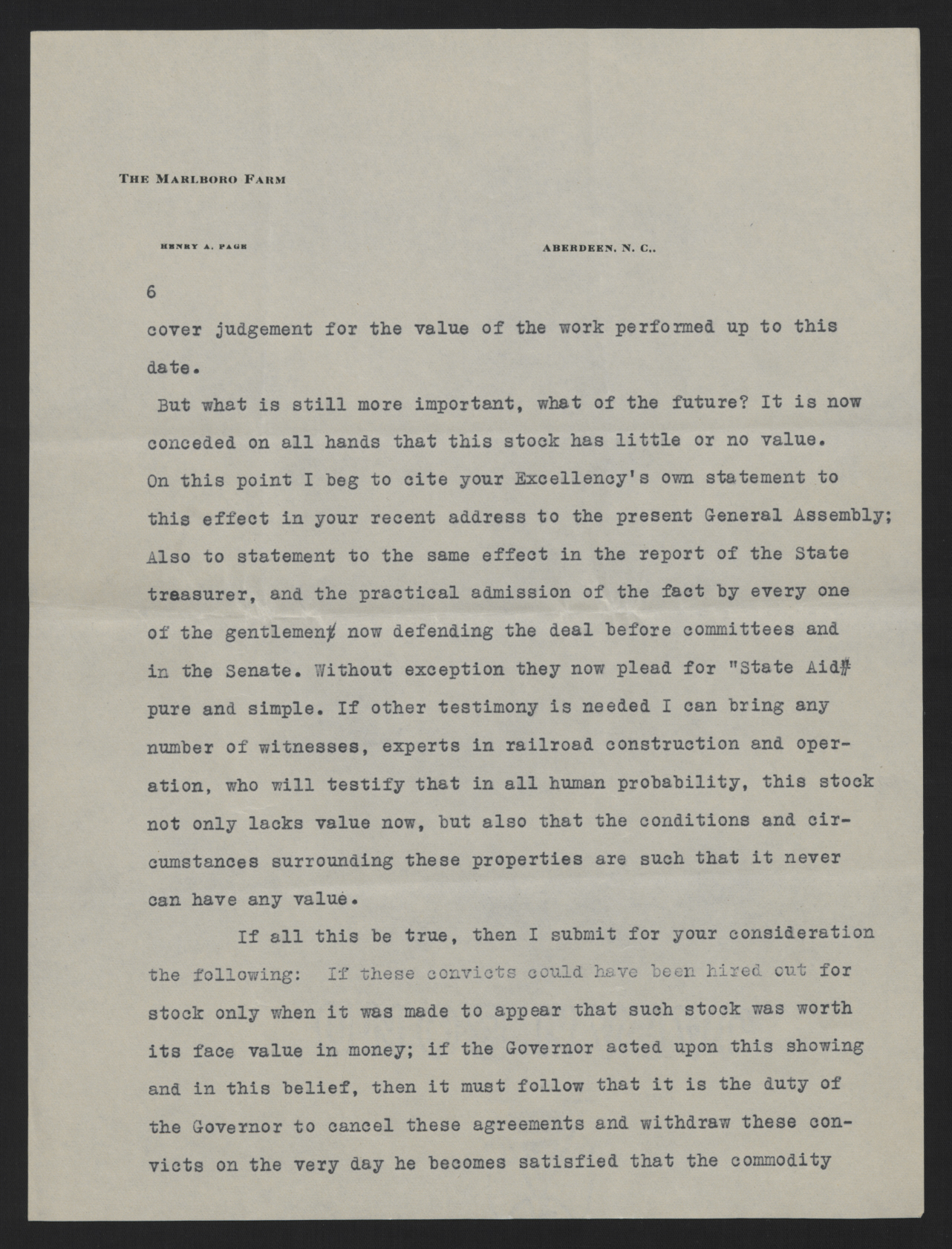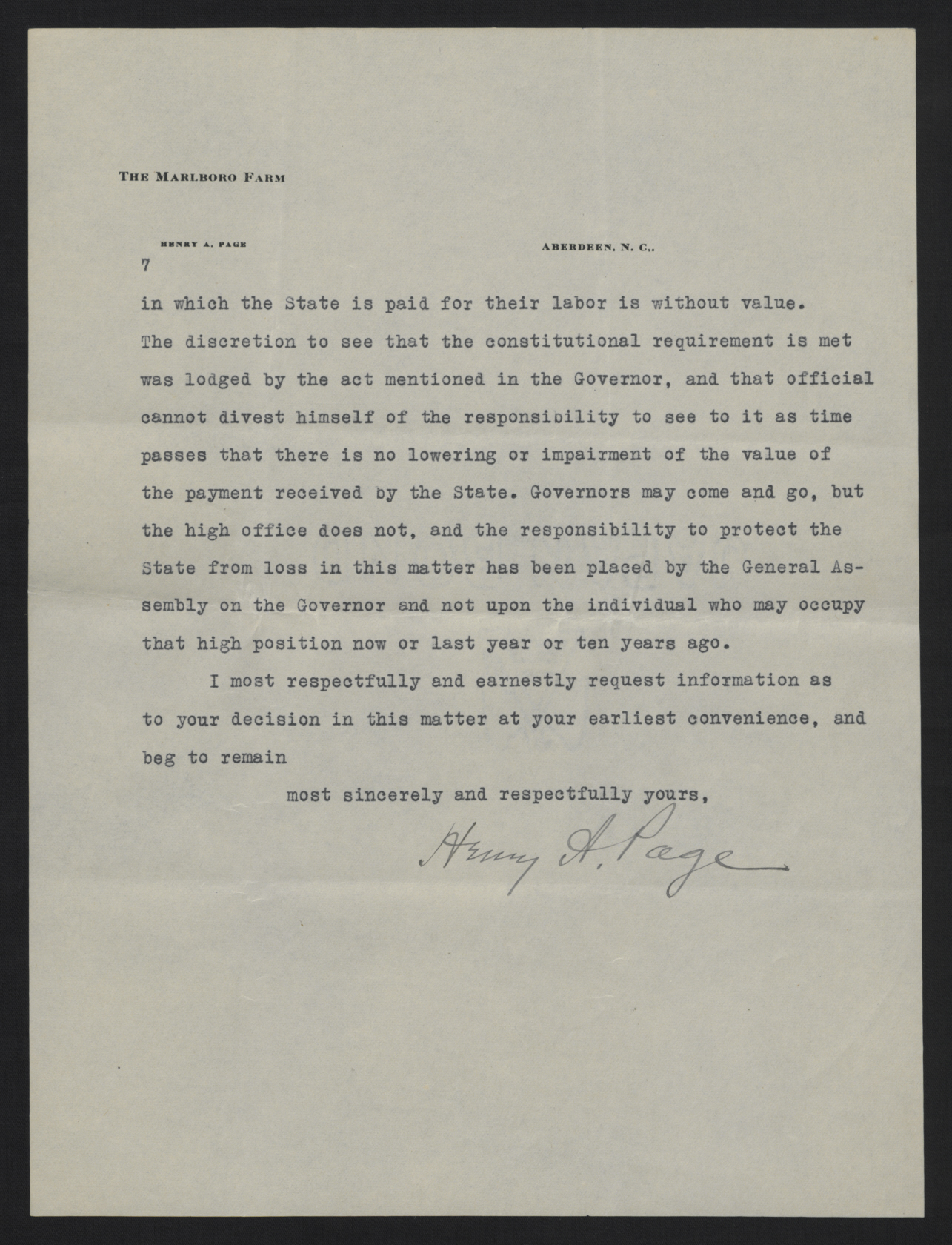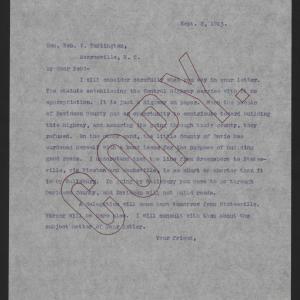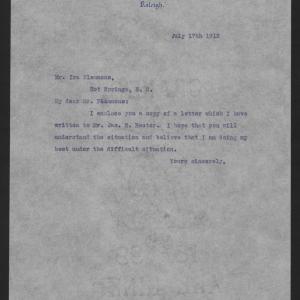Raleigh, N.C. Feb 8th 1915.
Honorable Locke Craig, Governor,
State of North Carolina,
Raleigh, N.C.
Sir:-
It appears that an exercise by you of the power, authority and discretion vested in the Governor of the State is the only possible way (short of an appeal to the courts) to end the existing financial scandal connected with the hiring of convicts by the State to certain railroads. I wish, if possible, to avoid the alternative mentioned, therefore I most respectfully ask your careful consideration of the following statement of the situation as it appears to me. I am convinced, in view of the changes which have taken place in material conditions since the convicts were first delivered to these railroads, that it is now the duty of the Governor of the State to terminate the so-called contracts and withdraw the convicts, or else demand and collect for their labor reasonable compensation in money or its equivalent.
The Constitution of the State of North Carolina, Art. 5 Section 4 contains the following restriction or limitation on the powers of the General Assembly; to wit:
"And the General Assembly shall have no power to give or lend the credit of the State in aid of any person, association or corporation, except to aid in the completion of such railroads as may be unfinished at the time of the adoption of this Constitution, or in which the State has a direct pecuniary interest, unless the subject be submitted to a direct vote of the people of the State, and be approved by a majority of those who shall vote thereon."
When the constitution was adopted in 1875 there were certain unfinished railroads receiving the use of convicts from the State and paying for these convicts in stock and not in money. It was clearly the intention of the framers of the Constitution to continue this policy until these particular railroads should be completed. But it is even clearer that they intended the practice of exchanging convist labor for railroad stock to end forever upon the completion of the roads then under construction. Note that the prohibition, "The General Assembly shall have no power to give or lend" etc. is the positive statement of the Constitution, while the permission to continue then existing conditions as to certain roads under construction was the exception to the rule. The conditions covered by the exception have long since been complied with, and therefore the section forbidding the General Assembly to give or lend the credit of the State stands today, and stood in 1907, without any exception whatever.
In a recent debate in the Senate, the Senator from Craven, in discussing the meaning of the language here quoted insisted that in the transactions now under discussion, there is no violation of the Constitution, because, in the worst aspect of the case the State is merely appropriating money from the treasury for the benefit the railroads, and is not in any sense "giving or lending the credit of the State to them. It may be that there is a technical legal obscurity locked up in that simple seeming phrase, but to the common mind of a common layman it would seem that one having authority to forbid my endorsing a note for my neighbor should certainly be permitted also to restrain me from giving him my money outright; and that the exercise of that authority in the matter of endorsement should reasonably be held to include the greater act of profligacy. The prohibition against "giving or lending the credit of the State" in aid of any person, association or corporation must, in all common sense also prohibit appropriating money out of the treasury in aid of such person, association or corporation.
The first Act passed under which the State is now accepting stock for convict labor is included in the charter of the Elkin and Alleghany Railway Company, same being Chapter 159 of the Private Laws of 1907. Section 20 of this chapter reads as follows."
"That the Board of Directors of the State Penitentiary shall, upon the application of the president of the said railway company, approved by the Governor, turn over to said company convicts not otherwise appropriated************ and whenever and as often as so much as $1000 shall have been expended or earned by the said board of directors of the said state's prison under the provisions of this act, it shall be entitled to demand and receive, and said company shall issue and deliver to the said board of directors a certificate for ten shares of the capital stock of said railway company of the par value of $100 each, made out in the name of the State of North Carolina, which shall become a stockholder to the extent of such shares, and shall be entitled to participate in the profits of such company pro rata with other stockholders, and to be represented and vote its shares in all meetings of stock holders in the same manner as other stockholders may be entitled to vote, through a proxy to be named by the Governor of the State of North Carolina********* Provided further that upon the delivery of said certificate of stock so issued to the State Treasurer credit shall be given to the said board of directors of the North Carolina state's prison for the par value of the shares of stock represented by such certificate."
Every possible phase of "State Aid" as now understood is certainly forbidden by the section of the Constitution hereinbefore quoted. How then can convicts be hired out and payment taken in stock of this railway as above provided for by chapter 159, Privat Laws of 1907? The Act is clearly not operative without the approval of the Governor. Why is the completion of the deal left in his hands? What particular and special point is he to safe-guard before he delivers these convicts? Not the matter of granting State Aid to this private corporation because no discretion is left with any one by the constitution on this point. Whenever, in the exercise of his sound discretion, he finds as a fact that the commodity to be received in payment for the labor of these convicts is actually and really and truly worth its face value in money, then and not until then can he be permitted to accept same in payment, under the act quoted as modified and controlled by the Constitution of the State. There is nothing else that he could possibly be supposed to use discretion about. I therefore think it is perfectly clear that the intention of the General Assembly of 1907 was to authorize the exchange of convicts for stock in the Elkin and Alleghany Railway when and only when the Governor should be entirely satisfied that such stock was worth its face value in money. Any other idea leads directly to the conclusion that the members of that General Assembly intended to "lend the credit of the State" or appropriate the money of the tax payers to the benefit of this private corporation in direct defiance of the plain prohibition of the Constitution. If therefore these convicts were hired out under representations made by the persons hiring them that the stock to be issued in payment for them was worth its face value in money, then it seems to me that an action should be brought in the name of the State to recover judgement for the value of the work performed up to this date.
But what is still more important, what of the future? It is now conceded on all hands that this stock has little or no value. On this point I beg to cite your Excellency's own statement to this effect in your recent address to the present General Assembly; Also to statement to the same effect in the report of the State treasurer, and the practical admission of the fact by every one of the gentlemen now defending the deal before committees and in the Senate. Without exception they now plead for "State Aid" pure and simple. If other testimony is needed I can bring any number of witnesses, experts in railroad construction and operation, who will testify that in all human probability, this stock not only lacks value now, but also that the conditions and circumstances surrounding these properties are such that it never can have any value.
If all this be true, then I submit for your consideration the following: If these convicts could have been hired out for stock only when it was made to appear that such stock was worth its face value in money; if the Governor acted upon this showing and in this belief, then it must follow that it is the duty of the Governor to cancel these agreements and withdraw these convicts on the very day he becomes satisfied that the commodity in which the State is paid for their labor is without value. The discretion to see that the constitutional requirement is met was lodged by the act mentioned in the Governor, and that official cannot divest himself of the responsibility to see to it as time passes that there is no lowering or impairment of the value of the payment received by the State. Governors may come and go, but the high office does not, and the responsibility to protect the State from loss in this matter has been placed by the General Assembly on the Governor and not upon the individual who may occupy that high position now or last year or ten years ago.
I most respectfully and earnestly request information as to your decision in this matter at your earliest convenience, and beg to remain
most sincerely and respectfully yours,
Date:
Sender:
Recipient:
Related People:
Repository:
Collection:
Places:
»» North Carolina »» Craven

